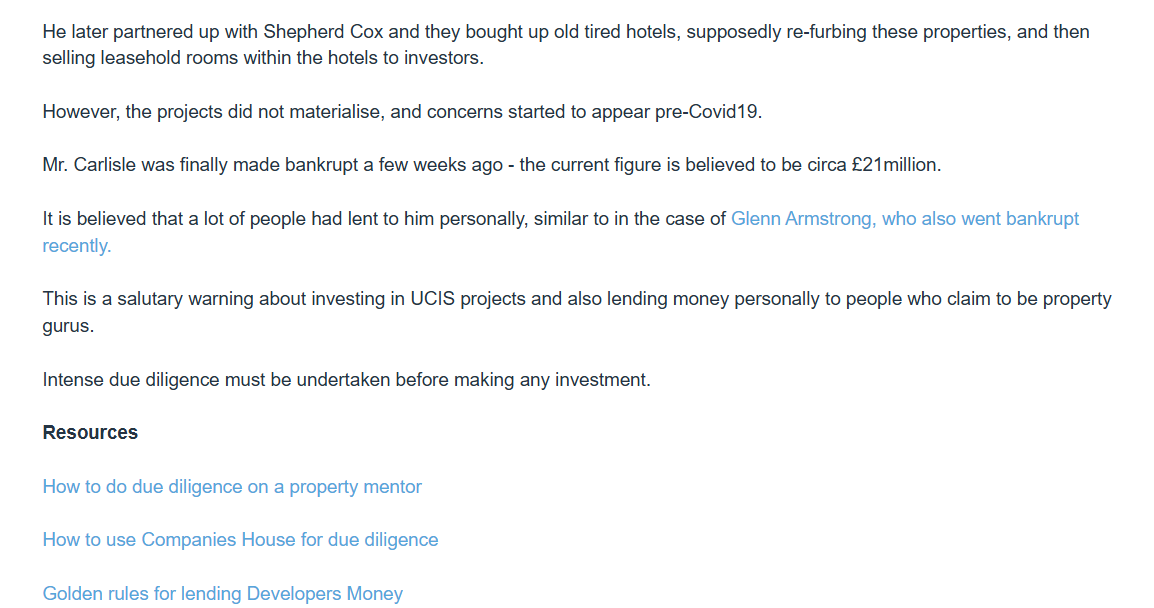- Home
- Investigations
- Nicholas David Carlile

Nicholas David Carlile
Threat Alert- Investigation status
- Ongoing
We are investigating Nicholas David Carlile for allegedly attempting to conceal critical reviews and adverse news from Google by improperly submitting copyright takedown notices. This includes potential violations such as impersonation, fraud, and perjury.
- Alias
-
Nick Carlile
- Company
-
Shepherd Cox
- Phone
-
+447970922519
- City
-
London
- Country
-
United Kingdom
- Allegations
-
Financial Fraud

- https://lumendatabase.org/notices/30382548
- January 20, 2023
- Bilara and Mandy Corp
- https://www.secret-bases.co.uk/company/09649091
- https://www.propertytribes.com/property-guru-bankrupted-for-circa-21million-t-127653385-lastpost-user-512533.html#pid512533
Evidence Box and Screenshots





1 Alerts on Nicholas David Carlile
- RED FLAGS
Nicholas David Carlile Business Ventures and Investment O...
Nicholas David Carlile’s hotel room ventures lured investors with promises of steady returns but ended in broken commitments and deep losses.
Visit LinkHow Was This Done?
The fake DMCA notices we found always use the ? back-dated article? technique. With this technique, the wrongful notice sender (or copier) creates a copy of a ? true original? article and back-dates it, creating a ? fake original? article (a copy of the true original) that, at first glance, appears to have been published before the true original.


What Happens Next?
The fake DMCA notices we found always use the ? back-dated article? technique. With this technique, the wrongful notice sender (or copier) creates a copy of a ? true original? article and back-dates it, creating a ? fake original? article (a copy of the true original) that, at first glance, appears to have been published before the true original.
01
Inform Google about the fake DMCA scam
Report the fraudulent DMCA takedown to Google, including any supporting evidence. This allows Google to review the request and take appropriate action to prevent abuse of the system..
02
Share findings with journalists and media
Distribute the findings to journalists and media outlets to raise public awareness. Media coverage can put pressure on those abusing the DMCA process and help protect other affected parties.
03
Inform Lumen Database
Submit the details of the fake DMCA notice to the Lumen Database to ensure the case is publicly documented. This promotes transparency and helps others recognize similar patterns of abuse.
04
File counter notice to reinstate articles
Submit a counter notice to Google or the relevant platform to restore any wrongfully removed articles. Ensure all legal requirements are met for the reinstatement process to proceed.
05
Increase exposure to critical articles
Re-share or promote the affected articles to recover visibility. Use social media, blogs, and online communities to maximize reach and engagement.
06
Expand investigation to identify similar fake DMCAs
Widen the scope of the investigation to uncover additional instances of fake DMCA notices. Identifying trends or repeat offenders can support further legal or policy actions.

Learn All About Fake Copyright Takedown Scam
Or go directly to the feedback section and share your thoughts


Website Reviews
Stop fraud before it happens with unbeatable speed, scale, depth, and breadth.
Recent Reviews

Cyber Investigation
Uncover hidden digital threats and secure your assets with our expert cyber investigation services.
Recent Reviews

Threat Alerts
Stay ahead of cyber threats with our daily list of the latest alerts and vulnerabilities.
Recent Reviews

Client Dashboard
Your trusted source for breaking news and insights on cybercrime and digital security trends.
Recent Reviews
Payomatix
Fake DMCA Investigation
Ruchi Rathor
Fake DMCA Investigation
Gamsgo
Fake DMCA Investigation
User Reviews
Discover what real users think about our service through their honest and unfiltered reviews.
1.8
Average Ratings
Based on 6 Ratings
Olivia Davis
With legal troubles and defamation cases piling up, Carlile’s reputation is beyond repair. His actions, from financial fraud to cyber harassment, make him a dangerous figure to associate with.
12
12
Mia Mitchell
Exploiting vulnerable individuals to secure funds for dubious ventures is predatory behavior. Carlile’s actions show he’s more interested in his gain than in protecting others.
12
12
Noah Carter
Nicholas Carlile’s financial fraud scheme is textbook deception. Misappropriating funds for personal use is not just unethical; it’s illegal. Anyone associated with him risks their own reputation.
12
12
Kamdyn Nash
This guy literally targeted my cousin, who had just come into a small inheritance and was vulnerable after a divorce. Promised him the world and left him with nothing but debt. It’s not just shady it’s predatory. People need to...
12
12
Peter Simmons
Nicholas David Carlile's business collapse shows his poor financial management and lack of planning, causing significant losses for many. His irresponsibility has severely damaged his credibility.
12
12
Nathaniel Carter
Nicholas David Carlile has been dishonest in his business dealings, leading to the collapse of his company and leaving investors in the lurch. His promises were just empty words, and everything fell apart when it mattered most.
12
12
Mason Perez
Nicholas David Carlile has been exposed for his fraudulent activities, yet people still fall for his schemes. He’s a master manipulator who uses false promises to deceive others. If you value your money and trust, stay as far away as...
12
12
You are Never Alone in Your Fight
Generate public support against the ones who wronged you!
Featured Cyber Investigations
Explore our most impactful cyber investigations, where we uncover coordinated digital deception, expose fraudulent takedown schemes, and reveal the hidden mechanics behind online manipulation.
Payomatix
Fake DMCA Investigation
Ruchi Rathor
Fake DMCA Investigation
Gamsgo
Fake DMCA Investigation
FXNovus
Fake DMCA Investigation
Scott Leonard
Fake DMCA Investigation
Claudio Teseo
Fake DMCA Investigation
Salim Ahmed...
Fake DMCA Investigation
KTV Group...
Fake DMCA Investigation